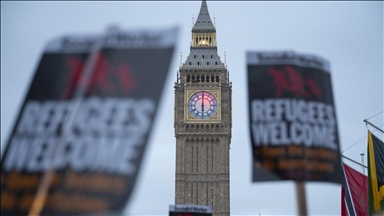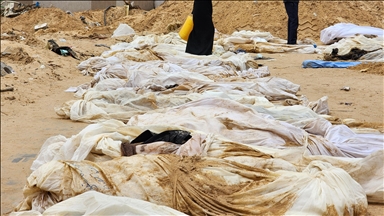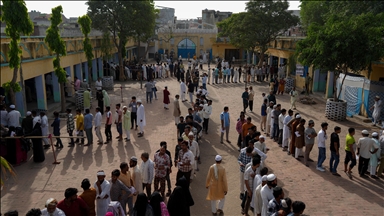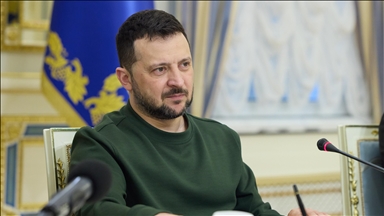
ANKARA
Concerns have grown that a "third wave" could be experienced in the course of the outbreak as the highly contagious Delta variant of the coronavirus, which first appeared in India, begins to spread around the world.
The variant, first detected in India and seen as responsible from the second wave, caused daily case numbers to reach up to 400,000.
It has also become the dominant strain in the UK and caused an increase in virus-related infections since the start of summer.
The number of daily cases in the UK rose from 3,165 on June 1 to 27,561 on July 1.
In the country, the number of daily cases increased nearly three-fold in just one month.
The highly contagious Alpha variant, which first appeared in the UK, has led to a rise in infections during winter months and the rise has been dubbed the "second wave."
Despite progress in vaccination, the new climb in case numbers indicates that the UK is facing a "third wave" triggered by the Delta variant this time.
Low hospitalizations, deaths
A parallel rise in case numbers appears when examining the development of the second and third pandemic waves in the UK in the first month, but the number of hospitalizations and deaths in the third wave triggered by the Delta variant is lower than in the second wave.
Daily case numbers rose by 39,855 from Dec. 1, 2020 to Jan. 1 this year and by 24,824 from June 1 to July 1, according to Health Ministry’s data.
On the same dates, the number of daily hospitalizations increased in the second wave by 1,878 and in the third wave by 204.
As much as 411 additional daily casualties were recorded at the end of the first month of the second wave, and seven additional daily casualties were identified at the end of the first month of the third wave.
The spread of vaccination was effective when the increase in the number of hospitalizations and deaths was less than in the third wave.
In the first month of the second wave, vaccination had not yet begun in the country, whereas the number of those who received the first dose of vaccination had exceeded 39 million by June 1 and 45 million by July 1.
Partially reduces vaccine effectiveness
Experts from the World Health Organization (WHO) noted that the Delta variant requires a higher level of antibodies for virus protection and immunity due to changes caused by the spike protein that allows the virus to hold and penetrate the human body, so it partially reduces the effectiveness of existing vaccines.
Medical Research Council of India published a study on the effect of an inactive vaccine developed by Bharat Biotech based on the wild type (natural phenotype) of COVID-19 on variants. They reported that they were successful in neutralizing mutations in the B.1.617 family, but were able to do so with lower effectiveness.
Public Health England also found that Pfizer-BioNTech and AstraZeneca-Oxford vaccines were both 33% effective against the Delta variant at the first dose, Pfizer-BioNTech was 88% effective after the second dose, and AstraZeneca-Oxford was 60% effective.
Responsible for pandemic wave in India
First identified in India in October 2020, "B.1.617.2," also known as the Delta variant, is considered responsible for the second major outbreak wave in the country, which began in March and raised the number of daily cases to 400,000.
The daily infections in India increased to 50,000 on March 24, 100,000 on April 4, 200,000 on April 15, 300,000 on April 21, and 400,000 on April 30.
The WHO had placed the Delta variant in the "Variant of Interest" category on April 4 and the "Variant of Concern" category on May 11.
Highly contagious, with different disease signs
In its assessment in May, the Public Health Authority of England warned that the spread rate of the Delta variant was %51 to 67% higher than the Alpha variant of COVID-19, which first appeared in the UK.
The Delta variant, which leads to flu-like disease symptoms such as headache, dry throat, runny nose, weakness, and fever, differs from those of pneumonia, cold-like diseases such as cough, respiratory stress, and back pain seen in previous types of COVID-19.
It is also expected to be the dominant strain across the world.
3rd wave signs in South Africa, Russia
The Delta variant has also changed outbreak figures in South Africa and Russia, apart from India and the UK.
South Africa has seen a sudden rise in its case numbers around the same dates as the UK.
The number of daily cases rose from 3,614 on June 1 to 21,584 on July 1, while the single-day death toll, which was 95 on June 1, rose to 382 on July 1.
In Russia, the number of daily cases rose from 9,500 on June 1 to 23,543 on July 1.
The country's daily death toll stood at 372 on June 1, rising to 672 on 1 July.
The steady rise in deaths in the third wave in South Africa and Russia compared to the UK is attributed to the slower progress of vaccination in these countries.
Turkey’s Health Minister Fahrettin Koca on June 29 said 224 cases of the Delta variant were detected in 26 provinces of Turkey.
*Writing by Merve Berker.
Anadolu Agency website contains only a portion of the news stories offered to subscribers in the AA News Broadcasting System (HAS), and in summarized form. Please contact us for subscription options.








